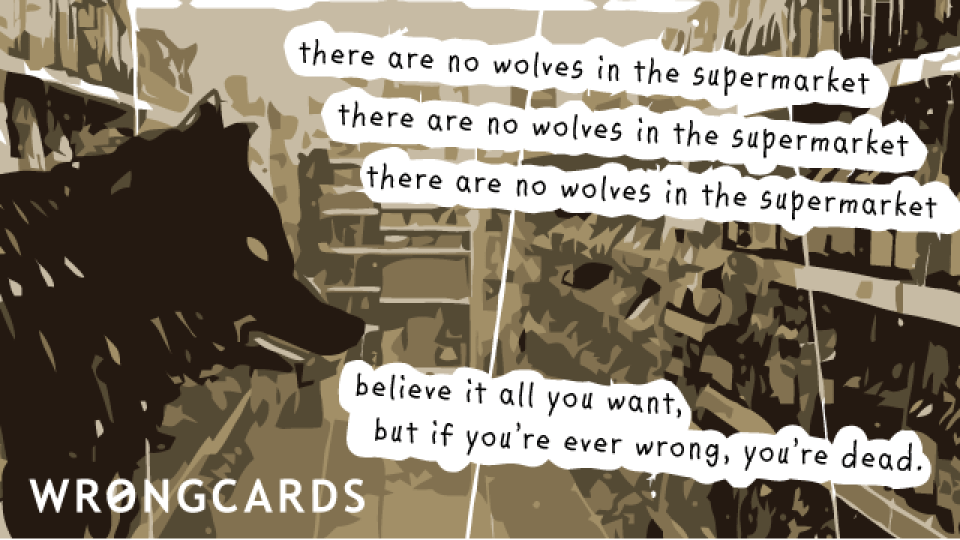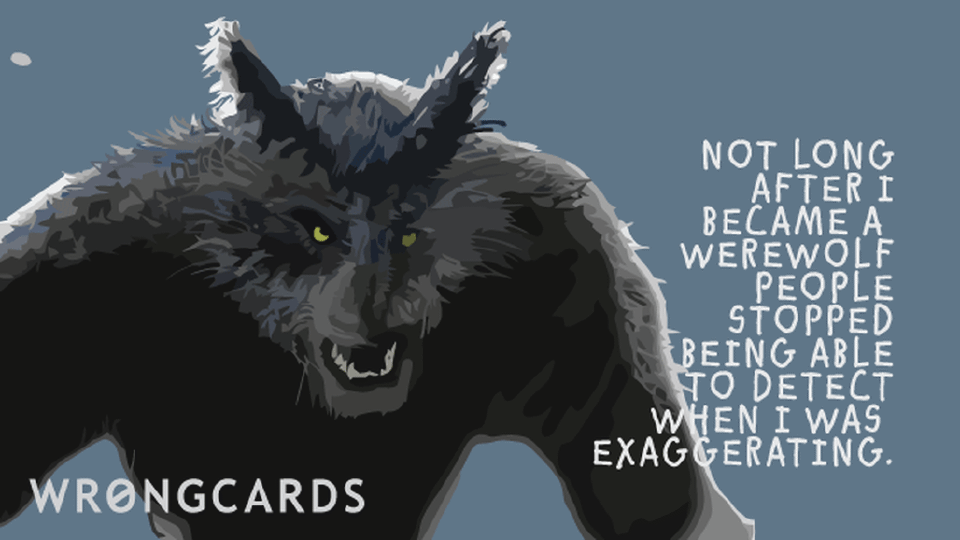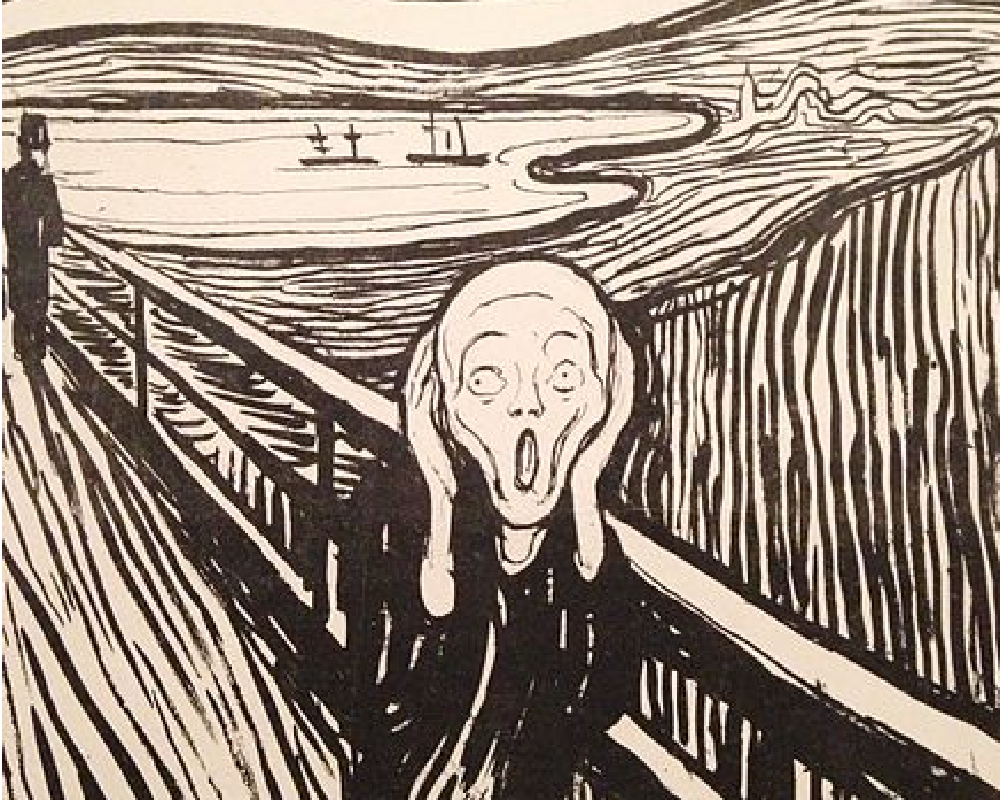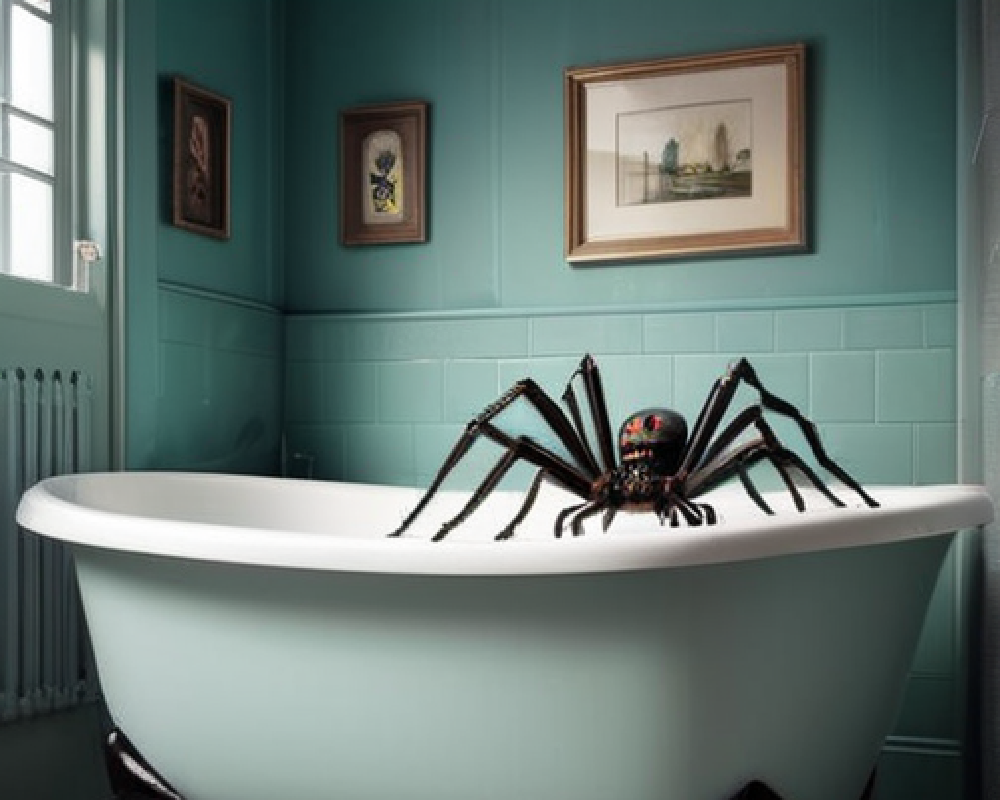I spend about forty minutes in there each day doing body-weight exercises, and twenty minutes in Childs Pose, sobbing in pain and wondering why I do it to myself. I used to call the room The Temple of Pain until my lady told me she felt it carried the wrong implication, and asked me politely to knock it off. I complied because I’m all about noblesse oblige. On the outside of the door I have a sign that says: “Kris’ room. The Dojo of Deprivation. Keep out.” And two skulls and crossbones for good measure.
The next thing you should know about me is that nobody can see that sign unless they’re me. I can see things that other people can’t see, or perhaps find too objectionable. I’m operating in multiple realities; in the one, there is a sign on that door in which only someone with my visual acuity can see, and in another reality, it’s an empty door that doesn’t have a sign on it because it would annoy my lady.
I come downstairs, and there’s Byron asleep on the couch. Byron is often asleep on my couch. He has an awesome place across the river but he prefers my couch on account of all the good food I have in my fridge.
I wrote to you all about Byron in my last blog post, and to be completely honest with you, I’d like to write a book about him except a thousand pages wouldn’t do him justice. Let me tell you how I met Byron.
In April 1999 I was kicking around Bremen in Germany. A couple of times in the nineties I was a homeless person, but then I pulled myself up my bootlaces and became a drifter. One day I’ll tell you all about it because it’s terribly romantic (except for the constantly going hungry business but I’ll leave that out) and it reveals how interesting I am as a person, but right now I’d prefer to talk about Byron, so it’s best if you don’t interrupt me. Spring was kicking off in Germany, and my girlfriend was buying me groceries. I was penniless, but I was also good looking and a drifter, and there’s nothing better than that, so she was buying me groceries and I was feeling awful. We were in Interspar, over near Luisental, and I was trying to talk her into maybe buying me chicken because beggars really can be choosers if they really put their mind to it and have no shame. She was a vegetarian and having none of it.
‘I’ll buy it,’ I said. ‘I have ten marks, you know. Tell me, what’s the German word for chicken?’
And she was a committed vegetarian and refused to tell me, which is what any vegetarian should do in such circumstances. I pestered her and she refused. So I said: ‘Fine.’
I took two steps away from her, grabbed a passing German by the elbow, looked at him seriously and then did the most perfect imitation of a clucking chicken laying an egg that you have ever heard in your life. I also pointed around wildly with a wondering look on my face. The poor man’s eyes goggled and he jogged away from me in fright.
My girlfriend, and I swear this is true, literally fell onto the floor of the supermarket; she lay down on her back and laughed uncontrollably for a full minute. (We’re still friends and she still does things like that occasionally; it’s the coolest thing you’ll ever see). But at the time I felt chagrined at her and the German’s lack of cooperation.
When she regained her composure I pulled her back up to her feet (honestly, where is the decorum of some people?) and suddenly a handsome young bloke with a lost air came wandering around the corner of the aisle. It was Byron, and I was introduced to him. He was an American friend of my girlfriend who was also an American, which is probably where they knew each other. I’m good at extrapolating like this.
I shook his hand, gazed at him levelly for a moment, and said: ‘Byron? Hmm. I like the cut of your jib, Byron. I think we’re going to be lifelong friends.’
Byron looked at me in that startled way of his and looked like he was going to run away as well.
That afternoon my girlfriend decided she was going to have a ’night out with the girls’ (whatever the hell that means) and it really annoyed me so I said, ‘fine, I’m going to have a night out with the boys’. She pointed out that I didn’t know any ‘boys’ in Germany and I remembered Byron.
‘Byron is my friend. I met him today.’
She said she didn’t think Byron would want to hang out with me, and I said we’ll see about that, and she said yes, we’ll see about that, and I said, yes we will, and she said, uh-huh. And then she took out a piece of chewing gum and began to chew it. I stared pensively out the window until I realised she was reading a book, and so then I went through her address book and found Byron’s address and left the apartment without another word.
He lived about half a mile away if you hadn’t been there before, didn’t know the area, and got lost along the way, which is what I did, until I realised that he actually just lived in next door. I trudged back, found the building and knocked on his door. When he opened it, he looked at me in almost fright and I reintroduced myself.
‘Hey, uh, you… We met today. In the grocery store.’
‘Hello,’ he said, looking apprehensive.
‘Byron, I need you to get ready and come with me. We’re going to go to a bar right now where we shall get extremely drunk.’
‘Why,’ said Byron.
‘Because..’ I trailed off, looking at him. He looked a bit morose and paranoid. ‘Because I want to kill you, Byron. I’m going to leave your body in a ditch.’
‘Hang on,’ he replied, ’let me get my jacket.’
He wandered around his apartment for a bit, so I followed him in, looked around and helped him find his jacket, which was blue, I remember, and hanging on the back of his door. Always the last place you look, you know?
And we did go out, but we didn’t get very drunk because I had to explain Nietzsche to him and I needed him to focus for those three hours.
In ensuing weeks I would see him walking past our window and one time I threw a potato at him to get his attention but he didn’t notice. That’s how difficult it was to befriend him at first. My girlfriend and I started having parties every Sunday in the shoebox apartment where we lived, and we’d make crepes on the tiny stove. People called me The Crepe God, which goes to show how good I am at that particular piece of domestic awesomeness. We’d get Byron over, and cram about 15 other people into our 350 square foot flat, and Byron would sit on the floor in the corner and read a book. We loved him. Plus his hair was even better than mine which was a complete novelty.
Then one day we all left Germany. I went back to Australia and did another stretch of unemployment (the era I described in The Petrol Station Incident) but we stayed in touch. In 2001 I was in Washington D.C. (remember: I was a drifter) and we met up and hung around there for a week. He was trying to decide what to do with his life and we were talking about it at Teaism in Dupont Circle. I asked him what he wanted to do with his life, and he said he’d like to do something significant.
‘What kind of impression would you like to make on the world?’ I asked
He thought about it and said,‘I guess it depends on what floor I jump from.’
I was impressed. I’ve spent years around some people without them being able to impress me with remarks like that.
Byron spent a couple of years in absolute boredom in which he seemed to do a lot of staring into space and flailing his arms about. He did a stint as a kindergarten teacher, and he was great at that, but it wasn’t enough. Let me tell you why it wasn’t enough.
It seems that some of us can’t go through life without creating things, because without it we can’t stay sane. We create things, we write or draw or code or sculpt or paint, and if we don’t create, we simply wake up one day and realise we’re going mad. If we don’t catch ourselves in time, we do indeed go mad, lose all our creativity and then wind up working in marketing or something.
People loosely call it the Artistic Temperament but it’s really difficult to convey to people who don’t have it. Most of my friends seem to be system administrators, scientists, librarians, publishers. What’s odd about those professions is they offer only low doses of opportunity for creative enterprise. I tried to be a scientist for a few years at Harvard Medical School before it became apparent that it wasn’t psychologically tenable for me. I couldn’t sleep. I became manic and distressed, the world drained of color. One time a guy pushed in front of an old lady to get on the bus, I followed him into the bus and kicked him in the arse. He fell over, and then I lectured him on the etiquette of allowing elderly passengers to precede them when boarding a vehicle. That’s how silly I was getting. I might have been days away from quitting everything and entering a career in marketing.
Finally I decided enough was enough, and I created Wrongcards, not of choice but of necessity.
I’d see Byron occasionally, he’d be out there, lost and staring into space, and then I’d take a look at his sketchbook and realise that he was in exactly the same psychological straits as myself. He was a Maker, but he wasn’t BEING a Maker, and he was so abject that he was probably already wondering how he could trick people into buying things they didn’t need.
If you’re not a Maker, you might wonder why we make such a fuss of our lives and don’t simply make things and calm the hell down. But here’s the truth: making things is still much harder for us than anything else we do.
There are plenty of people around me prepared to pay me good money to focus on their projects and leave Wrongcards behind, and those projects would be far easier because they don’t require me to live inside my creative mind, which is an uneasy place filled with menacing shadows and insights into the truth of things.
My creative mind is the one I explained to you that can see the sign on the door of the Dojo of Deprivation. Before my eyes, superimposed, is the other, flickering reality. Pterodactyls and airships fly through the sky when I walk down the street with my dog. I have to live a very quiet, gentle life, because my mind is on fire; I run an almost constant fever. Creating a wrongcard, inside the daily circumstances of my life, is an impossible thing I do routinely a couple of times a week. I imagine things for about eighty hours a week, and therefore work is about walking around in an upside-down world. I look up to the sky and I see bears descending from brightly colored parachutes. I warn Byron when we go into a supermarket to be on guard for werewolves. He understands immediately what we have to do. We hunt werewolves for a while, then assure each other that the coast is clear and we have a serious conversation about how much easier it is these days since the decline in the werewolf population.

A year or so ago Byron moved up to Boston to work at Harvard and we began collaborating together. He is the sort of person who can run with any idea, which is what I first realised when I told him I wanted to kill him and leave his body in a ditch, and he went to look for his jacket.
So there is a particular mental state that my job, and my temperament, requires. That mental state requires preservation. I am required to avoid a certain type of disenchanted person, and sadly I am often required to avoid every type of person. But the final, most important and non negotiable thing is that I am required to be constantly productive.
One time, last year, someone said to me a little churlishly, after I declined yet another invitation to some kind of dinner party because I wanted to work, that it’s a little hard to be friends with someone who enjoys working more than hanging out with them. It reveals the subtle complexity of the matter because, honestly, should a man be blamed for the fact that drawing pictures of werewolves is really much more fun than sitting around a table listening to grown-ups in collared shirts trying to impress each other with their knowledge of wines? Some part of me worries about situations like that. Mental states are contagious things, and I have a lot of contact with Harvard people, so I’ve had to take the reluctant precaution of extracting promises from my nearest and dearest to smother me in my sleep if I ever say one single word about a fine Shiraz. I have parachuting bears to think about.
Meanwhile, Byron is procrastinating when he is supposed to be upstairs in my office drawing absurd pictures, but in fairness he’s mentally tired from all this ‘watching for werewolves’ business of the past week. He’s reading a book even though our survival, as artists and as living people, requires a perennial hyper-vigilance.
I’m looking at him across the room. Upstairs, folded neatly in my closet, is the werewolf costume that he still doesn’t know about.
He looks so peaceful.




